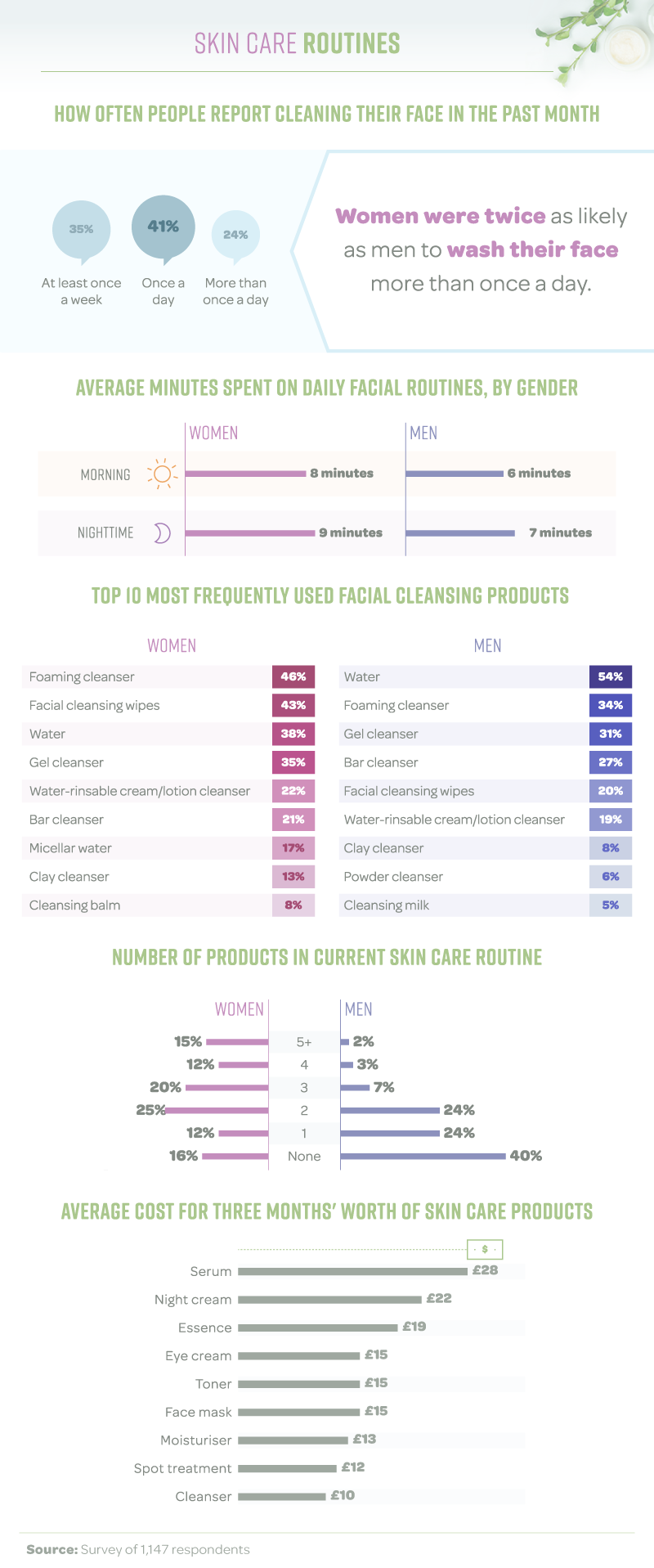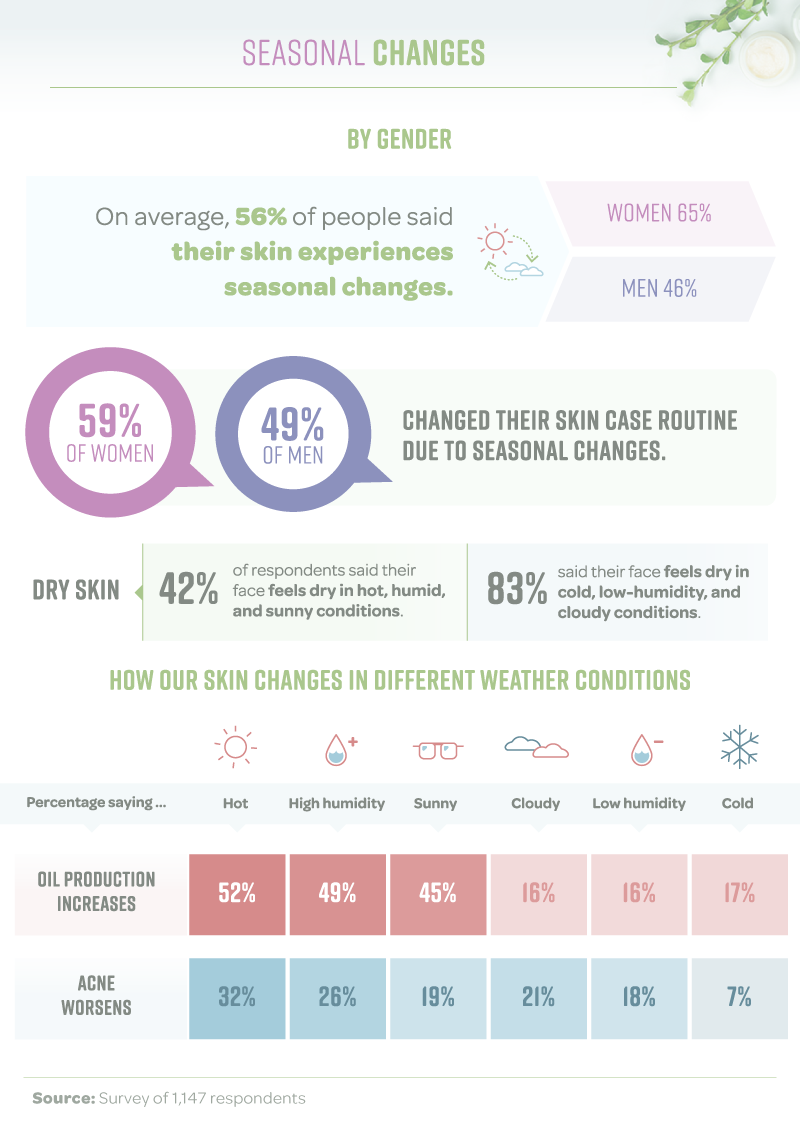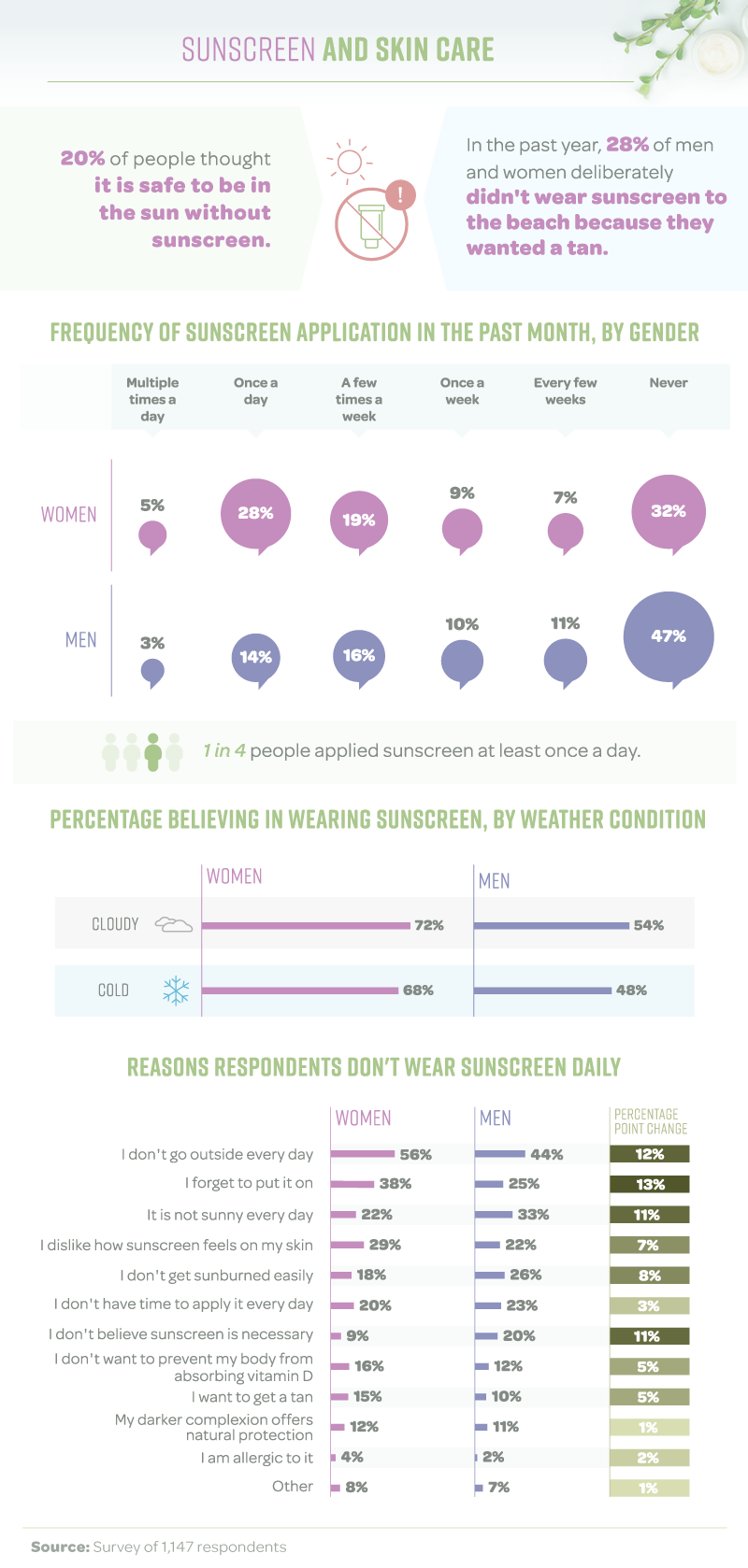
Are you looking for a new facial cleanser? If you don’t know where to start, you might feel overwhelmed by the sheer volume of choices.
While every part of the world experiences a unique climate, most people deal with weather changes throughout the year. In the same way that your wardrobe changes to accommodate warmer or cooler temperatures, your skin care routine should change too. While many skin care staples (including cleanser and SPF) won’t go away, experts say you should consider products with different textures to keep your complexion healthy no matter the time of year.
We surveyed over 1,140 people to learn the average skin care routine. While nearly 400 people washed their face sparingly throughout the week, another 300 washed at least twice daily. Read on as we look at the most popular facial cleansing products for men and women and how many consider sunscreen a necessity or an inconvenience.
Making Skin Care a Habit
Unlike the clinical advice found on Superdrug Online Doctor, the internet is full of skincare solutions that aren’t based on medical studies and haven’t been reviewed by real doctors. Several popular recommendations (including only using SPF when it’s sunny out or exfoliating blemishes) can be flat-out wrong.
Over 41% of our respondents washed their face daily, while 24% washed their face more than once a day and 35% reported occasionally cleansing throughout the week. As we found, women were twice as likely as men to wash their face more than once a day. While there’s no consensus from experts or dermatologists on the exact frequency with which you should wash, it’s important to recognise that not all skin care advice will apply to you.

Men may take a more minimalist approach to skin care. A little over 54% of men used water, followed by foaming (34%) and gel cleanser (31%). 47% of women used three or more facial products daily – including over 15% who used five or more products – whereas 40% of men had no skin care routine. Respondents were also more likely to commit to cleaning their face in the evening than in the morning.
Even though ‘skin care’ seems to imply products and cleansing routines, experts suggest “skip-care” is sometimes the best for a quality skin care routine and only 15% of us actually need a daily moisturiser. Applying too many products or over-cleansing your skin can break down its natural layers of oil and moisture. Instead of giving yourself a natural glow, too many steps in your routine can lead to inflammation, clogged pores, acne, and flaking.
Changing It Up
Although it’s false to say you don’t need to wear sunscreen regularly because the sun isn’t shining as brightly, your skin care routine should change based on the climate. Cooler weather with less humidity typically requires transitioning from lightweight moisturisers to heavier skin creams. Similarly, if you spend more time in the harsh, central heating at home, it’s important to drink extra water to avoid inflammation and redness in your complexion.

A study published by the British Journal of Dermatology found that a protein in our skin that helps produce a barrier is impacted by colder weather. As a result, those living in colder climates may experience a higher risk of permanent skin conditions including atopic eczema and rosacea. The study concluded that emollients during the winter and sunscreen during the summer could help reduce skin damage caused by harsher weather conditions.
Safe From the Sun?
According to the British Association of Dermatologists, over 100,000 new cases of skin cancer are diagnosed every year in the UK. While some of these cases include areas of the body not exposed to direct sunlight, it’s believed that extensive exposure to UV radiation from the sun is the culprit in a majority of diagnoses.

Just 20% of people thought it was not harmful to spend time in the sun without sunscreen, and in the past year, 28% of men and women purposefully avoided sunscreen to tan. Forty-seven percent of men and nearly 32% of women said they never wear sunscreen, and over 1 in 4 women applied sun care products once a day or more often. The biggest reason for avoiding sunscreen was not going outside every day, although 38% of women had forgotten to put it on, and 33% of men didn’t wear sunscreen because the day wasn’t particularly sunny.
Finding Your Skin Care Routine
Finding a personalised skin care routine can be tricky and require trial and error, but it’s important not to overcomplicate the process. Sure, settling on a serum, toner, essence, and cleanser can feel overwhelming, but the basics are relatively straightforward.
Understand your skin type before investing in a cleanser, double cleanse if necessary, avoid harsh products, and scrub away. For a majority of people surveyed, water and a cleanser (either foam or gel) were among the most popular skin care products, although women were more likely to use a higher volume of products consistently than men.
At Superdrug Online Doctor, we provide treatments and advice for a number of skin conditions, including rosacea, psoriasis, eczema, and acne. Visit Superdrug Online Doctor to get the treatment you need for healthy, glowing skin today.
Methodology
For this project, we surveyed 1,047 respondents between the ages of 18 and 75, with an average age of 37, to find out about their skin care habits. Respondents were surveyed through Amazon’s Mechanical Turk survey community. 47% of respondents identified as male and 52% female. Anyone who did not correctly complete a hidden attention-check question was excluded from our results. Outliers were also excluded. In some cases, respondents could have lied or exaggerated when answering questions about their skin care habits. Possible issues could also include telescoping, selective memory, and more.
Fair Use Statement
Want to help share our skin care study with your readers to help them stay healthy this summer? The written data and graphics found here are accessible for noncommercial reuse provided a link back to this page is included in your story. For more information, feel free to reach out to [email protected].